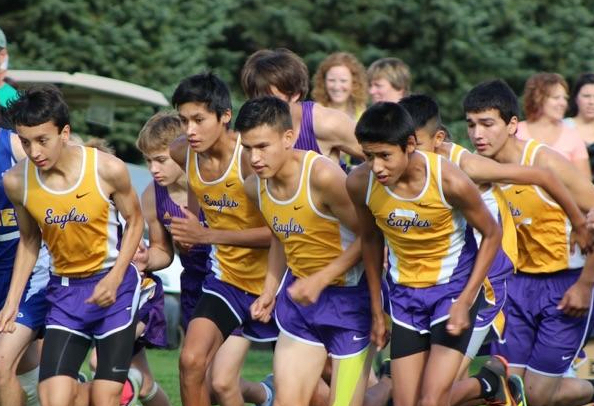By DAVE KOLPACK, ASSOCIATED PRESS
The most common sights on North Dakota’s Fort Berthold Indian Reservation are oilfield trucks and long-distance runners, neither of which can be stopped by the brutal weather and both of which leave everything behind them in the dust.
While running has long been a tradition at New Town High School, which encompasses five towns, the last decade or so has been a boom particularly for the boys cross-country program. The Eagles have won 12 North Dakota small-school titles in the last 14 years, including six in a row. The years they didn’t win, they finished second.
The Eagles are so talented and deep that they routinely win Class B meets by more than 100 points, including last fall’s state championship when their runners finished first, second, fourth, seventh and 15th. They regularly win events that include larger Class A schools. They have fans from across the state cheering for them and other athletes asking them for advice.
“You do feel like a celebrity sometimes,” Eagles senior DJ Lebeau said.
Lebeau said he and his teammates also take seriously their roles as representatives of a reservation made up of the Mandan, Hidatsa and Arikara tribes, and including the towns of New Town, Twin Buttes, Mandaree, Parshall and White Shield. He hopes their success will influence and inspire younger people on the reservation, where tribal officials are dealing with ongoing health problems like obesity and diabetes.
“Growing up on the reservation, I feel you have to work twice as hard as everyone else,” Lebeau said. “We’re just a little Native American team from western North Dakota and we are proud of what we have accomplished. It’s great that so many people look up to us and we’ve got to act that way.”
The secret to success? New Town coach Brian Anderson, who took over the program as it began its championship run 14 years ago, said he was fortunate to have a good team that first year. Its accomplishments resonated with younger students, and more students every year wanted to be part of it.
“The kids took care of a lot of the program-building because they encouraged other kids to come out for cross-country and track,” Anderson said. “It just kind of snowballed from there.”
The New Town runners cited several factors when asked about their elite status in North Dakota high school athletics. Junior Jaiven Hale, the individual champion in last fall’s state meet, said he began by trying to chase down two older brothers who competed for the Eagles. He was also influenced by his father, Jay Hale, an assistant coach and former college runner.
Senior Jalen Chase, the team’s top college prospect, said it’s about “kids seeing other kids having success every year.”
All of them say they feel more pressure in practice than at meets. One of their most difficult practice runs is a path that follows the Lewis and Clark Trail, named for the two explorers who navigated uncharted territory in the western United States. It’s a jaunt through rugged Badlands terrain that overlooks scenic Lake Sakakawea and ends with a half-mile uphill gut check.
“We don’t mess around in practice at all. We hold each other to a high standard,” Lebeau said. “The meets are a lot more fun. You can just let loose and run.”
Edgeley-Kulm’s Isaac Huber, who finished third in state behind New Town’s Hale and Robert White, said he has been influenced by the Eagles’ program and likes exchanging ideas about running and training with them. Huber attributes New Town’s supremacy to “repeated success and great coaching.”
“I remember when I was younger watching these New Town boys dominating the distance events. I thought that was pretty neat,” Huber said. “Then I got to know them my freshman year and I always look forward to running against them. Cross-country is almost like a family.”
Just a week after the Eagles claimed their sixth straight title, another boys cross-country record came to an end in the Desert Southwest. Lebeau said he and his teammates were aware of the tradition at Hopi High School, located on a reservation in northeastern Arizona, but didn’t know that Hopi’s streak of 27 consecutive state titles was broken in November.
“Oh my goodness, that is insane,” Lebeau said.
Many New Town runners have parlayed their athletic success into college degrees, jobs and high-ranking military service, Anderson said.
“They have used that dedication and responsibility to go out and do other good things in society,” Anderson said. “Cross-country shows you that you aren’t going to get anything unless you put in a lot of hard work.”
Chase, whom Huber calls “the most natural runner” he has ever seen, took a recruiting visit earlier this month to North Dakota State — five hours east, in Fargo, the state’s biggest city.
He said his goal has always been to live in a larger city.
“To be honest, I never really liked running at first, but once I took it seriously, I could see the opportunities it could present for me in college and elsewhere,” Chase said. “Running has really opened up a lot of doors for me.”
